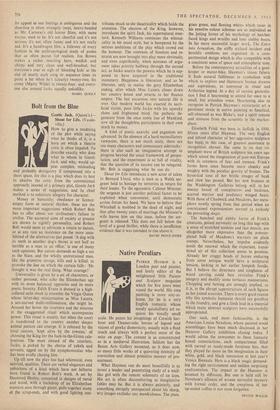Bolt from the Blue
Gentle Jack. (Queen's.)— Shout for Life. (Vaude- ville.)
How to give a rendering of the plot while saying what he thinks of it, is a horn on which a theatre critic is often impaled. To describe exactly who does what to whom in Gentle Jack, and why, would ap- pear complex, misleading and probably derogatory if compressed into a short space, for this is a play which does its best to absolve the critic from the conventional approach; instead of a primary plot, Gentle Jack makes a series of suggestions, and its chief method is to substitute allegory for character.
Money or humanity; obedience or licence; empty form or natural rhythm; these are the more important suggestions which Robert Bolt has to offer about our civilisation's failure to civilise. The accepted aims of society at present are shown to rigidify personality, and Robert Bolt would seem to advocate a return to nature, or at any rate an insistence on the more unin- hibited of the alternatives just posed. `A dog with its teeth in another dog's throat is not half so terrible as a man in an office,' is one of many such opinions. But nature demands as high a tax as the State, and the wholly unrestrained man, like the primitive savage, kills and is killed, to provoke the line on which the curtain falls: 'He thought it was the real thing. What courage!'
Universality is given by a set of characters, or rather persona:, who echo the Elizabethan age with its more balanced opposites and its more poetic ferocity. Edith Evans is dressed in a high- collared satin cloak to resemble the Virgin Queen whose latter-day reincarnation as Miss Lazara, a sex-starved multi-millionairess, she might be. Around her hover the courtiers and the minions in the exaggerated ritual which accompanies power. This ritual is society, but when the court is transferred to the country another deeper animal pattern can emerge. It is released by the local custom, 'kept alive by the townies,' of choosing the King for the Jack-in-the-Green cele- brations. The most abased of the courtiers, Jacko, is picked by the chorus of yokels and servants, egged on by the nymphomaniac who has been avidly chasing him.
Up till now the play has had whimsical, even satirical, qualities. There are verbal elegances and aphorisms of a kind which have not hitherto been found in Robert Bolt's work. A set by Desmond Heeley, conceived in designs of metal and wood, with a backdrop of an Elizabethan mansion seen through gauze, pulls together many of the scrap-ends, and with good lighting con-
on-
tributes much to the theatricality which holds the attention. The election of the King, however, introduces the spirit Jack, his supernatural over- lord. Kenneth Williams continues the whimsi- cality in his usual style, but is hampered by the serious 'ambitions of the play which crowd out the humour. The contrasts of freedom and re- straint are now brought into play more obviously, and even superficially, when neatness of argu- ment takes priority halfway through the second act, as Jacko asserts the powers which he is sup- posed to have acquired in the traditional mummery. Happiness is liberation; and so he liberates, only to realise the gory Elizabethan ending, after which Miss Lazara closes down her country house and returns to her finance empire. The last excursion into natural life is over. Our modern world has exacted its sacri- ficial victim, poor little Jacko with his squeaky shoes and frightened mind, the pathetic de- generate from the once noble line of Mankind, now all the thoughtless participants in their own death by money.
A kind of poetic anarchy and paganism are advanced. In the absence of a hard reconciliatory viewpoint, there is not much unity, there are too many characters and unnecessary sidetracks: there is also such an imaginative attempt to progress beyond the usual framework of presen- tation, and the experiment is so full of vitality, that the question of its success can be relegated. Mr: Bolt is suggesting what he can do.
Shout for Life introduces a new actor of talent in Bernard Lloyd, who is seen as a Welsh ser- geant held to hostage by terrorists in return for their leader. To the egocentric Cabinet Minister, the sergeant is just another political factor to be exploited when convenient, until democratic action forces his hand. We have to believe that Whitehall is mobbed in the dead of night, and that after twenty years of marriage the Minister's wife leaves him on this issue, before the ser- geant is released. This does not fall below the level of a good thriller, while there is insufficient evidence that it was intended to rise above it.
DAVID PRYCE-JONES






































 Previous page
Previous page